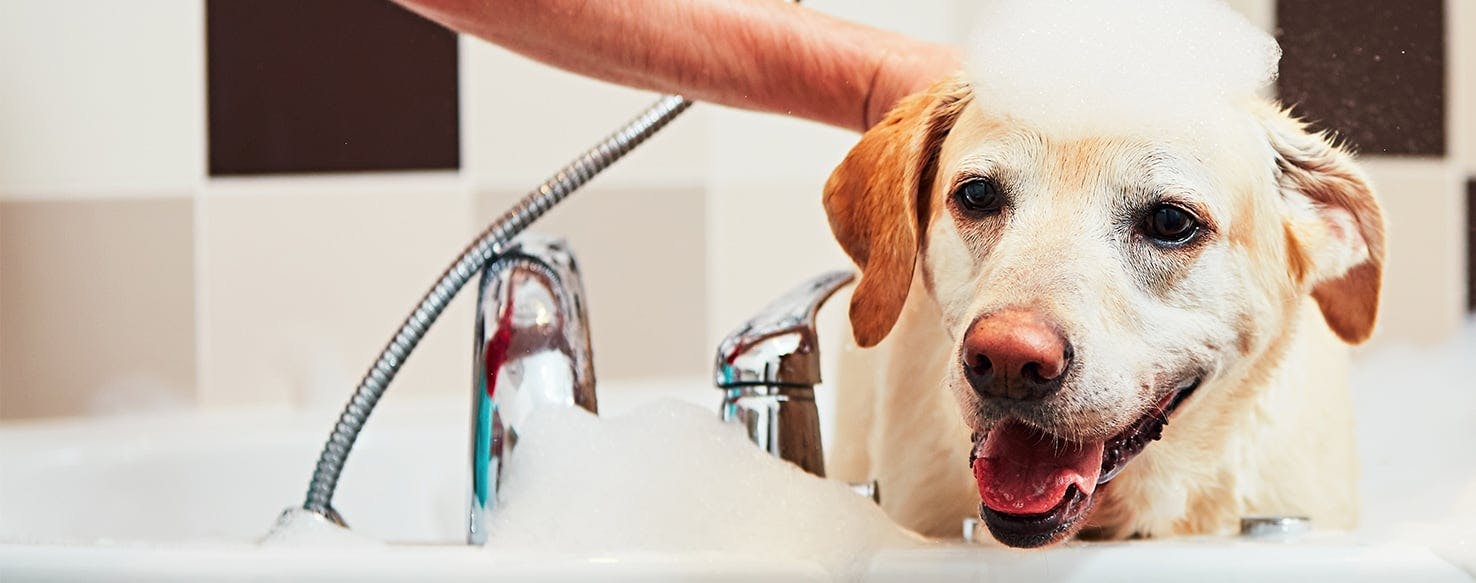Ever had to ride home with your dog after they’d been swimming at the lake? Or given your dog a bath, and thought they smelled worse afterward?
Why do wet dogs smell so awful and what can you do about it? Your dog has lots of microorganisms (yeasts and bacterias) living on the skin that produce waste products. When wet, these organic acids become aerosolized as water evaporates, and produce that awful wet dog smell we have all come to know! In addition, dogs produce sebum, a natural oil on their coat that helps protect their skin from drying out--some breeds have more of this substance than others. When this oil combines with water and bacteria, odor emanates.
Although not usually harmful, wet dog smell can be an indication of the amount of bacteria and yeasts present on your dog. If the amount of microorganisms living on your dog begins to get out of balance, the immune system can become overwhelmed and infections can develop. Also, skin and medical conditions can make wet dog smell even worse. Fortunately, there are several things pet owners can do to help reduce the smell of their wet canine companions and if wet dog smell indicates a medical condition, it can be addressed.

What causes wet dog smell?
Wet dog smell can be caused by natural oils and microorganisms like bacteria and yeasts that emit a foul smell when combined with water at bath time, or after playing in a lake, pond, or in the rain. If wet dog smell is just a result of normal doggy flora, there are several things you can do to remedy the smell.

- Groom your dog daily to brush off excess hair and debris. Make sure any discharge from the eyes and ears is removed, and excrement and urine are wiped off.
- Bathe your dog every month or as per a vet's recommendations. Use a good shampoo designed for dogs, and rinse residue off well. Be careful not to overwash as this can dry out your dog's skin and hair coat, and cause skin conditions that will make odor more problematic.
- Make sure your dog's fur and skin dry thoroughly. Use more than one towel to dry them off after a bath. Or, blow-dry your dog (making sure the dryer setting is on low), which helps remove the bacteria on the dog's hair shaft and down to their skin.
- Use a scented spray designed for dogs. It is important, since dogs self-groom, not to use just any type of scented spray that may be toxic to your dog.
- Wash your dog's bedding regularly so microorganisms don't have a second home!
- On furniture, bedding, and carpets you can spray a diluted vinegar mixture to disinfect and deodorize dog smell. Or, use baking soda on furniture and carpets and vacuum it up afterward to remove odors.
Certain dog breeds, notably retrievers and hounds, have sebum oil on their coats that can, when combined with water and bacteria, emit a smell. If your dog has sebum oil on their coat, completely drying them off as soon as possible with a blow dryer after they get wet will reduce the smell emitted from this doggy dermal combination.
Dogs with parasites, bacterial skin infections, or yeast infections can be particularly funky smelling when wet. These infections can get into folds of the skin and creases, where they multiply and cause skin problems that are both irritating for your dog, and smelly for everyone else. Addressing parasites, bacteria, and yeast conditions with the appropriate medications will relieve your dog's discomfort and yours.
Other medical conditions, such as endocrine and metabolic disorders, as well as gastrointestinal disorders, can also cause your dog to be smellier than usual. Taking your dog to the veterinarian regularly to address medical conditions, and receiving appropriate treatment will keep them healthy and your nose happy.
If your dog is at risk of developing an endocrine or metabolic disorder, check out our
pet insurance comparison tool. Brought to you by Pet Insurer, Wag! Wellness lets pet parents compare insurance plans from leading companies like
Figo and
Healthy Paws.
What are the benefits of preventing wet dog smell in dogs?

Although natural microorganisms on your dog's coat will emit a certain amount of odor when wet, there are steps pet owners can take to reduce the smell. However, if wet dog smell is excessive it can point to a medical condition such as an infection or disease that needs attention. Addressing any skin conditions and diseases will benefit your dog's health and make them more pleasant to be around by reducing odor.
What are simple steps to stop the smell?

Dogs smell bad when wet due to bacteria and other microorganisms present on their skin. Regular grooming, coupled with thorough drying usually keeps odor under control. Several natural products around your home, like baking soda and vinegar, will deodorize furniture and carpets. If your dog is particularly smelly, check to see if they have a parasitic, bacterial or yeast infection that needs addressing, as these can add to wet dog smell. Other medical conditions and diseases can also contribute to odor, so a trip to the veterinarian may be necessary to check for other causes of excess odor in your dog.


